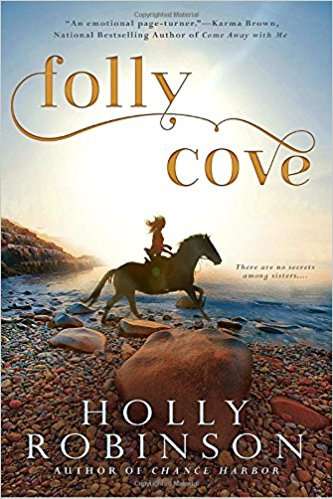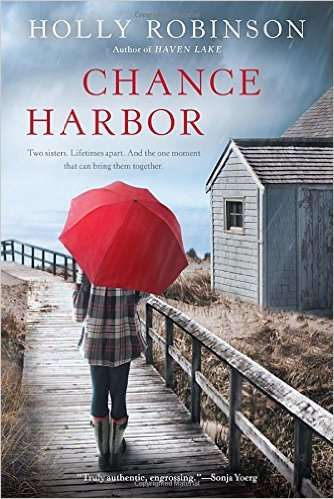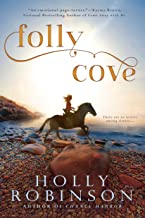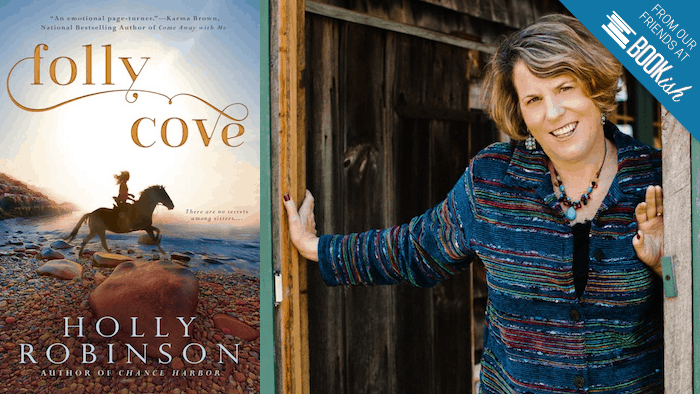Folly Cove by Holly Robinson
BookTrib is partnering with Bookish to bring you more great content, including this interview with Holly Robinson, discussing her release, Folly Cove.
Holly Robinson has done it all. She’s a novelist, ghostwriter, journalist, and essayist. But she’s confessed to us that writing novels is her favorite job. We caught up with Robinson this April at the Newburyport Literary Festival to talk about her latest book, Folly Cove, and she shared why examining the bonds of sisterhood is important to her. She also offered a sneak peek at her latest project (a historical novel!) and let us know how the main character took hold of her and would not let her go.
has done it all. She’s a novelist, ghostwriter, journalist, and essayist. But she’s confessed to us that writing novels is her favorite job. We caught up with Robinson this April at the Newburyport Literary Festival to talk about her latest book, Folly Cove, and she shared why examining the bonds of sisterhood is important to her. She also offered a sneak peek at her latest project (a historical novel!) and let us know how the main character took hold of her and would not let her go.
Bookish: In your latest book, Folly Cove, you explore the rich and deep well of sisterhood. What is it about sisterly relationships that is so eternally fascinating to us?
Holly Robinson: I’m fascinated by sister relationships and so I do write about them a lot. I had a sister and she died of cystic fibrosis when she was five and I was 12. It was a huge blow to my family, as you can imagine. Since then, during big life transitions (like when I traveled, when I had my first child, when I got married, when I got divorced, when I got married again), I think about how old my sister would be at the time and I wish I had a sister to share these events with.
I was also very close to both of my grandmothers, and both of them had many sisters, so I’d watch their interactions. One of them lived with us from the time I was 14, and I was always fascinated by how close she was with her sisters and yet how acrimonious her sisterly relationships could be. It was really love/hate a lot of the time and there was a lot of rivalry among the sisters. It’s one of the most complex relationships in human dynamics. It seems much more complex than between brothers. I have girls and boys and I’ve watched them growing up. I’ve watched my two girls, and their relationship goes through ups and downs and unbelievable complications, whereas the boys just duke it out and one ends up on top. It’s not always the same one. They just have a different way of dealing with conflict.
Bookish: The book follows the lives of the Bradford sisters. Can you tell us about them?
HR: There are three sisters and they grew up in the inn. The oldest is Laura, who is a driven, no-nonsense person. She always feels a little at odds with the other two. She’s married and there’s a really deep secret in her marriage that she is struggling with. I love Laura the most. She’s also the most difficult, because she’s working the hardest. I have compassion for her.
Then there’s Elly, who is from Los Angeles. She’s blonde, beautiful, and leggy, and has been putting off any sorts of commitments because she wants to make it big in Hollywood.
Finally, there’s Anne, the youngest. Anne is the one I actually started with. I think of her as the heart of the book. When the book opens, she comes back to Folly Cove after living in Puerto Rico because the relationship with her child’s father has exploded. He also had a secret, which the readers will find out pretty early on in the book. I relate more to Anne because Anne is more like me, getting herself into scrapes and trying to get herself out of them.
Bookish: Motherhood is also a strong element in your fiction. In Folly Cove, Sarah Bradford is the mother of the three sisters. Can you tell us what type of mother you consider her to be?
HR: I based Sarah on my own grandmother, who lived to be 99 and was very proper. You had to be a lady around her. She was from England, drank tea every afternoon, and always wore a skirt. I don’t think I saw her in a pair of pants until she was about 60. Even then it was with stockings beneath them and heels. She was a hostess at Publick House, a well-known, historic inn in Sturbridge, Massachusetts. She used to tell me about working there. I also work as a ghostwriter and by chance, I ended up being the ghostwriter for the son of the family that owned the Publick House and that’s where I got the idea for the book. I started thinking about what it would have been like to grow up there.
As for mothers, my basic feeling is that most of us do the best we can with the tools we have. I actually wrote about ⅔ of the book and then had to throw it all out. I started out with just Anne’s point of view. But Sarah was so cold and I couldn’t figure out why. She wasn’t really abusive, but she was distant. I ended up rewriting the whole book including her point of view because I wanted to understand her. I quite liked her. She, too, had a secret from her past that made her the way she was and made her parent the way she did. Overall, I think she was a good mother in many ways, but flawed like all of us.
Bookish: You have set your books both locally (Rockport, Plum Island, etc) and internationally (Nepal, Prince Edward Island). Folly Cove is set in the beautiful town of Rockport, Massachusetts. What is it about a place that draws you to write about it?
HR: Places are almost a character for me. The ocean is a primal draw. For most of us who live on Massachusetts’ North Shore, whether we acknowledge it or not, there’s that sense of being part of the planet because of the rhythms of the ocean. The way the tides move in and out and our attraction to that is part of us. Maybe it’s because I’m a Navy captain’s daughter too.
 For example, in Chance Harbor, my novel before Folly Cove, I used Prince Edward Island because one of the main characters is a widow, who is grieving her husband, and also sorting out her own family secrets. I have a house on PEI, and I set it there partly because our part of the island feels like the end of the world and that’s what I imagined it would feel like to lose your husband and have to start all over again. That part of the island is remote. It’s the east end of the island, where you can see Cape Breton Island across the Northumberland Strait and it just feels wild and against the elements. You feel alone.
For example, in Chance Harbor, my novel before Folly Cove, I used Prince Edward Island because one of the main characters is a widow, who is grieving her husband, and also sorting out her own family secrets. I have a house on PEI, and I set it there partly because our part of the island feels like the end of the world and that’s what I imagined it would feel like to lose your husband and have to start all over again. That part of the island is remote. It’s the east end of the island, where you can see Cape Breton Island across the Northumberland Strait and it just feels wild and against the elements. You feel alone.
When I set Sleeping Tigers in Nepal, it was about a sister whose brother had disappeared and she went in search of him. I wanted her to have to go to extreme measures. I also wanted to write about Nepal because I had trekked there. There are few places more extreme.
Bookish: A large part of the book takes place at the Folly Cove Inn, which is run by Sarah. Why did you choose an inn for this particular family? What about it exemplifies their relationships?
HR: I made up the Folly Cove Inn, although there actually was a Folly Cove Inn, which I didn’t find out about until after the book came out. The woman read my book and invited me to go see the inn, which was in operation until the 1940s. I actually based my Folly Cove Inn on the Emerson Inn in Rockport.
As for the inn, it’s a family business, which I know something about. My dad raised gerbils. It’s one of the more bizarre businesses, but because of that I understand how much a business becomes a part of the family structure and how the children are not nurtured in the same ways. We are not seen as people who need to be delicately cared for. We are seen as worker bees. You are put to work at a young age in an inn, just as you are put to work at a young age in a gerbil farm. You’re 13 and you’re heaving things around and folding sheets. That kind of life really makes you into someone who can work hard. You aren’t afraid of work. You can take challenges. There’s something positive to be said for that, but it’s also exhausting and it means that the relationship between parent and child is also the relationship between employee and boss, which alters the dynamics. If you screw up, your boss is mad at you and she’s not going to be your loving mother.
Bookish: From journalism to ghostwriting to fiction writing, you’ve done it all. Which kind of writing do you enjoy the most?
HR: Fiction. I also love writing essays. I write a lot of personal essays for NPR and women’s magazines. I do a lot of blogging as mini-essay writing. My other favorite thing is ghostwriting memoirs, which is pretty much my steadiest income and I love it. I do these for celebrities, business people, singers, and some TV personalities. It’s great. You get to step into this other world and you get to play part journalist and part therapist because someone will say to you, “…and then he kissed me,” and you say, “Well if you were kissed by so-and-so, who is really a famous person, you need to tell us where his hands were. What were you wearing? What did he smell like? What did he taste like?” I get to ask these really nosy questions and I get to write it like a novel. The best memoirs are written like novels with narrative arc, and dialogue, and description.
Bookish: Are you working on anything right now?
HR: Yes, I can’t help myself. I’m always working on a new book. The novel I’m working on now is killing me because I’m venturing into historical fiction. I was in the John Greenleaf Whittier house and I happened to see a print of a painting by Childe Hassam, one of the first impressionist painters of the United States, of Celia Thaxter. It is this beautiful painting. She’s all in white, standing amongst all of these tall flowers, and it’s very striking. I said to the docent, “Who is that?” and she said, “That’s Celia Thaxter, the poet from the Isles of Shoals. She was famous in her time.” I started wondering why I didn’t know who she was. Celia Thaxter basically got in my car as I was leaving the museum and came home with me. I couldn’t stop thinking about her. I ended up going to the Isles of Shoals and visiting her garden, which they’ve restored. Her family had the first grand hotel resort in all of New England. It was a 500-room hotel called Appledore House. So the novel is another hotel story, but set in 1878.
I’m having so much fun doing the research and actually going to the places she lived, reading all of her poetry, and reading all the biographies of other women writers of that time. What struck me about the story is that she traded work with other women writers like I trade work with other women writers. She was a mother who had a horrible marriage, who really lived mostly apart from her husband but couldn’t get divorced at that time or chose not to. She had a child with disabilities who she took care of fiercely so that her husband wouldn’t put him in an institution. I found myself really admiring her for all of these things. Plus she had this incredible literary salon on the island where artists, writers, and musicians would get together to make art together. It was this fabulous setting. I thought I just have to do that in a novel. I’ve been researching and working on that novel for about a year.
I also have a contemporary plotline with a character who finds a mystery related to Celia Thaxter, and she’s unraveling it through a garden that she’s taking care of that has all kinds of clues in it. Celia Thaxter’s most famous book is called An Island Garden, and she was famous as a gardener on the Isles of Shoals.
Bookish: Is it a blessing and a curse to always have a next project going or is it mostly a blessing?
HR: It’s always a blessing. For writers who are mothers especially, I feel like you need that portal that you can disappear into. If I don’t have that portal to disappear into, I’m really unhappy.
Novelist, journalist, and ghost writer Holly Robinson is the author of The Gerbil Farmer’s Daughter: A Memoir and six novels: Sleeping Tigers, The Wishing Hill, Beach Plum Island, Haven Lake, Chance Harbor, and Folly Cove. Her articles and essays have appeared in dozens of national publications. She and her husband have five children and a stubborn Pekingese. They currently divide their time between Massachusetts and Prince Edward Island, and are crazy enough to be fixing up old houses one shingle at a time in both places.




